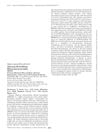 April 2008 in “Obstetrics, gynaecology and reproductive medicine”
April 2008 in “Obstetrics, gynaecology and reproductive medicine” Hirsutism is often caused by high male hormone levels and can be treated with lifestyle changes and medications.
 July 1996 in “Trends in Endocrinology and Metabolism”
July 1996 in “Trends in Endocrinology and Metabolism” The book is a valuable reference on androgenic disorders for professionals but not suitable for laypeople or medical students.
[object Object]  1 citations,
February 2017 in “Journal of gynecology and womens health”
1 citations,
February 2017 in “Journal of gynecology and womens health” The document concluded that more research is needed to understand how estrogen affects the enzyme involved in hirsutism development.
 September 2022 in “Dermato”
September 2022 in “Dermato” Adult acne is often related to hormonal disorders, especially in women, and may need long-term treatment involving specialists.
 10 citations,
January 2003 in “Seminars in reproductive medicine”
10 citations,
January 2003 in “Seminars in reproductive medicine” The article explains how to identify and treat excessive hair growth in women, which can be distressing and may signal other health problems.
 6 citations,
January 2013
6 citations,
January 2013 Hyperadrenocorticism in ferrets is linked to neutering and indoor housing, and is best treated with surgery and a deslorelin implant.
 5 citations,
May 2017 in “Current Opinion in Pediatrics”
5 citations,
May 2017 in “Current Opinion in Pediatrics” Hormonal therapies are safe and effective for treating acne in female adolescents, with specific treatments for those with endocrine disorders.
 2 citations,
September 2004 in “Fertility and sterility”
2 citations,
September 2004 in “Fertility and sterility” High androgen levels can cause excessive hair growth and may indicate serious health issues, including heart disease and fertility problems.
 2 citations,
January 2014 in “International Journal of Endocrinology”
2 citations,
January 2014 in “International Journal of Endocrinology” Women with a certain type of tumor had higher levels of pregnancy hormone and male hormones, which decreased after treatment.
 30 citations,
September 2017 in “Clinics in Dermatology”
30 citations,
September 2017 in “Clinics in Dermatology” Acanthosis nigricans is a skin condition that may indicate a higher risk for insulin resistance and type 2 diabetes, and more research is needed to understand and treat it.
 38 citations,
January 2014 in “International Journal of Endocrinology”
38 citations,
January 2014 in “International Journal of Endocrinology” Adrenal disorders can cause lasting brain and behavior issues in children.
 November 2022 in “The Journal of Clinical Endocrinology and Metabolism”
November 2022 in “The Journal of Clinical Endocrinology and Metabolism” Postmenopausal hyperandrogenism, a condition with symptoms like increased hair growth and acne, is usually caused by PCOS but can also be due to other factors. It's diagnosed by checking testosterone levels and treated either by removing the adrenal tumor or through antiandrogen therapy.
[object Object]  35 citations,
March 2012 in “Experimental and Clinical Endocrinology & Diabetes”
35 citations,
March 2012 in “Experimental and Clinical Endocrinology & Diabetes” The conclusion is that accurately identifying the cause of high androgen levels in women with PCOS is crucial and requires specific tests.
 13 citations,
January 2012 in “International Journal of Trichology”
13 citations,
January 2012 in “International Journal of Trichology” Most hirsutism patients had idiopathic hirsutism or PCOS, with hormonal imbalances and signs like acne and irregular periods.
January 2025 in “JCEM Case Reports” Diagnosing and managing Glucocorticoid Resistance Syndrome is complex due to genetic differences and varied symptoms.
 76 citations,
November 2009 in “Medical Clinics of North America”
76 citations,
November 2009 in “Medical Clinics of North America” Hormones, especially androgens, play a key role in acne, which can be a symptom of systemic diseases like PCOS and may require targeted treatment.
 22 citations,
August 2011 in “Endocrine Practice”
22 citations,
August 2011 in “Endocrine Practice” Most hirsutism cases are due to PCOS, and treatment focuses on lowering testosterone and blocking its effects.
 2 citations,
January 2013 in “Elsevier eBooks”
2 citations,
January 2013 in “Elsevier eBooks” The chapter explains the causes of excessive hair growth and masculinization in women and how to measure hormone levels related to these conditions.
 24 citations,
January 2013 in “Indian Journal of Dermatology, Venereology and Leprology”
24 citations,
January 2013 in “Indian Journal of Dermatology, Venereology and Leprology” Hormonal treatment is effective for women with acne not helped by usual treatments, especially if they have hormonal imbalances.
 April 2023 in “Clinical Chemistry and Laboratory Medicine”
April 2023 in “Clinical Chemistry and Laboratory Medicine” The document concludes that inflammation markers can be used in diabetes, vitamin D3 affects immune pathways, hyperthyroidism changes hormone levels, androgen levels help diagnose Adrenocortical Carcinoma, erectile dysfunction is linked to diabetes, hypogonadism is common in HIV-infected males, and hormones can be biomarkers for various conditions.
 November 2022 in “Journal of the Endocrine Society”
November 2022 in “Journal of the Endocrine Society” A woman with ectopic Cushing's syndrome and COVID-19 passed away despite treatment.
 149 citations,
December 2007 in “The Journal of Clinical Endocrinology and Metabolism”
149 citations,
December 2007 in “The Journal of Clinical Endocrinology and Metabolism” Women with PCOS have overall higher body fat, not abnormal fat placement, and more insulin resistance.
 October 2023 in “Journal of the Endocrine Society”
October 2023 in “Journal of the Endocrine Society” The desmopressin stimulation test helped identify an adrenal cause for a patient's Cushing's syndrome.
 46 citations,
July 1988 in “Journal of The American Academy of Dermatology”
46 citations,
July 1988 in “Journal of The American Academy of Dermatology” Hormone imbalances can cause specific skin changes, which may help in early detection of endocrine disorders.
 16 citations,
September 2008 in “Dermatologic Therapy”
16 citations,
September 2008 in “Dermatologic Therapy” CAH is a genetic disorder affecting cortisol production and causing hormonal imbalances, with treatment and diagnosis varying by form and symptoms.
 42 citations,
November 2019 in “Frontiers in Endocrinology”
42 citations,
November 2019 in “Frontiers in Endocrinology” The document suggests creating a validated score to diagnose Cushing's Syndrome and considers plasma steroid profiling as a simpler diagnostic method.
 9 citations,
April 2020 in “Endocrinology, diabetes & metabolism case reports”
9 citations,
April 2020 in “Endocrinology, diabetes & metabolism case reports” Pregnancy with Cushing's syndrome is rare and risky for both mother and baby, needing early diagnosis and treatment.
 October 2023 in “Journal of the Endocrine Society”
October 2023 in “Journal of the Endocrine Society” A rare case of Cushing syndrome was successfully treated with one-sided adrenal gland removal, suggesting personalized treatment is important.
 45 citations,
January 2006 in “Endocrine journal”
45 citations,
January 2006 in “Endocrine journal” To diagnose Polycystic Ovarian Syndrome, two out of three signs—irregular periods, high male hormone levels, or cysts on the ovaries—are needed.
 10 citations,
January 2014 in “Endocrinology & metabolic syndrome”
10 citations,
January 2014 in “Endocrinology & metabolic syndrome” PCOS is a long-term condition that needs more research for better understanding and treatment.





























